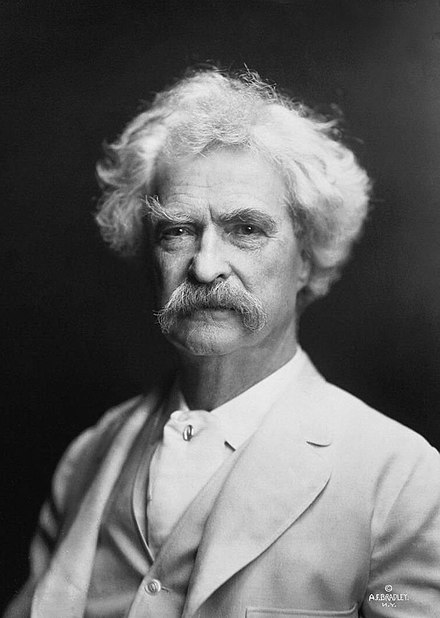Author, riverboat pilot, world traveler, and Freemason; Mark Twain wore many hats over his lifetime. While he is most well-known for his novel, The Adventures of Huckleberry Finn, Twain also led a Masonic life that influenced much of his writing. Read the rest of our feature on Mark Twain to gain some insight into what his life looked like as an author and “The Father of American Literature.”

Mark Twain is the author of The Adventures of Huckleberry Finn.
Early Life
Samual Langhorne Clemens, or more popularly known by his pen name Mark Twain, is one of the greatest American writers to date. Born on November 30th, 1835 in Florida, Missouri, he was one of six children. Twain was born two months prematurely and spent much of his young life in poor health. His early experiences as a sick child in his hometown of Hannibal, Missouri would later inspire the fictional town of St. Petersburg and the character Tom Sawyer in his novel, The Adventures of Huckleberry Finn. Twain was initially exposed to the world of literature while serving as an apprentice to a local printer. In 1850, at the age of 15, Twain worked at the Hannibal Journal, a weekly newspaper his older brother Orion owned. While his primary role was to act as a typesetter he occasionally added sketches to the paper and took over editor when his brother was out of town. In 1857, he moved to New Orleans and began working on the Mississippi River as a riverboat pilot. Twain continued to write satirical pieces for local newspapers about his life as a riverboat pilot. When the Civil War began Twain returned to Hannibal and served a two-week duty as a soldier before he moved to Nevada and tried his hand at mining. His mining skills proved to be below average and he returned to his love for writing and journalism. Twain jumped from state to state in his early years exploring the country and trying his hand at several jobs, it wasn’t until he turned 37 that he realized he was a “literary person.”
Literary Career
As an author, Mark Twain published over 20 novels and dozens of short stories, essays, and lectures. Most remembered for his novel, The Adventures of Huckleberry Finn, Twain mastered mixing wit and satire with dark and thought-provoking prose. The Adventures of Huckleberry Finn was published in February of 1885 in the United States and is often referred to as “The Great American Novel.” This novel is required reading in many schools across the United States and is a model for American literature. It’s also important to acknowledge that while The Adventures of Huckleberry Finn was a revolutionary novel, it is highly controversial due to the racial slurs Mark Twain used. The use of highly offensive language like this does not align with Masonic values. Apart from The Adventures of Huckleberry Finn he is also known for, The Adventures of Tom Sawyer, The Prince and the Pauper, and The Mysterious Stranger.
Freemasonry
Mark Twain’s abilities extend past his life as an author and into his journey as a Freemason. Initiated as an Entered Apprentice at Polar Star Lodge on February 18th, 1861 Brother Twain was among many other riverboat pilots in his time at Polar Star Lodge. After being raised to Master Mason, Twain left for the Nevada Territory to join his brother Orion. Unfortunately, this transition resulted in a short term suspension of membership but there is evidence that points to his interest in visiting other Masonic lodges during his time out west. Upon returning from the Nevada Territory, Twain quickly petitioned to be reinstated to his home lodge of Polar Star. In the late 1890s, Twain set out on a world lecture tour that took him to Australia, India, Canada and several other countries. While he was traveling Twain often found Masonic connections to whatever country he was visiting. He was especially interested in Lebanon’s connection to the Craft and sent home a hand-crafted gavel to the Worshipful Master at Polar Star Lodge. Twain made various references to Freemasonry in his writing and used the Masonic term, “great Architect of the Universe” when referring to God. Mark Twain’s dedication to writing, exploring, and Freemasonry is inspiring to all. Referred to by many as the “Father of American Literature” we are proud to call him a Brother!
Interested to learn more about other famous Masons? Read our blogs on Buzz Aldrin, Arnold Palmer, and Irving Berlin!